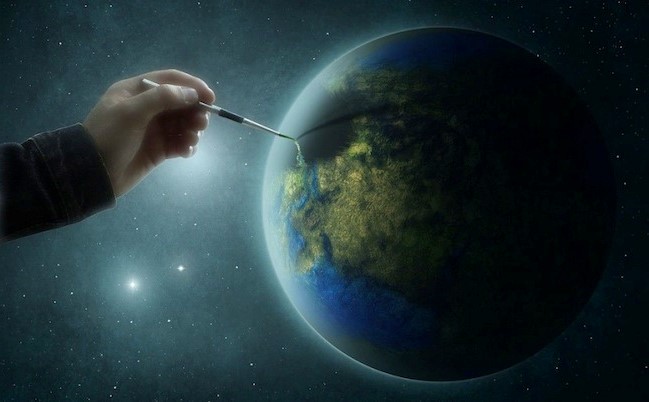The title of this article “alternatives” to evolution would suggest that there are other explanations for our existence that are just as viable and well-supported. Arguments against evolution are as valid as offering a “potato on fire” as an alternative explanation for the huge fireball that the Earth revolves around. Simply put, evolutionary biology is the foundation of science because it explains everything. For instance, when seeking out treatment for medical conditions, chemists don’t simply throw a bunch of random concoctions together and hope they achieve helpful outcomes. They need to understand why the body reactions a certain way in certain situations, and evolution provides the perfect explanations. Sadly, lots of people around the world are skeptical of evolution because we are stubborn people who want to believe whatever it is we choose to believe, regardless as to whether it is grounded in evidence. They’ll say “Well, evolution is merely a theory, a hunch” which completely misunderstands what the term theory means in the scientific sense. Anybody who wants to education themselves can learn more about what a scientific theory is. In the meantime, here is a list of 6 alternatives to evolution.
1. Biblical Creationism
Biblical Creationism is based on the idea that everything in Genesis is literally true: a divine entity created the universe in 6 days, with light appearing on Day 1, the atmosphere on Day 2, dry ground and plants on Day 3, the Sun, Moon and stars on Day 4, birds and sea animals on Day 5, and land animals and humans making their grand debut on Day 6. Creationists also believe in a Young Earth that’s only 6000 years old.
The issue:
The Bible is an ancient religious text, not a science book. It was
written at a time when humans didn’t have the slightest idea how
science worked, so Genesis provided answers to explain things that
couldn’t be explained at the time. That’s why, for instance, the
Earth is described as being flat and at the center of the universe
when scientific discoveries in the past few centuries has since
proven that this is not the case. The scientific evidence is simply
too overwhelming to ignore, although it hasn’t stopped people from
ignoring it anyway.

2. Ancient Astronauts
This is kind of a fun one. The idea here is that millions of years ago aliens in space ships came to Earth, planted the seeds of humanity because why not, and then guided us before taking off and leaving us to our own fate. The “evidence” is the pyramids, the Mayan calendar, and those spaceship thingies that you see in medieval paintings.
The issue:
Sorry for making your life less fun, but all of these ancient
astronaut legends have been thoroughly debunked no matter what
ufologist Giorgio Tsoukalos might have told you.

3. Intelligent Design
As you fiddle around with your iPhone, you have great confidence that it was created by some research and design folks at Apple, and that it didn’t just form by itself. That’s similar to the argument that proponents of Intelligent design are trying to sell. Life is too complex to have occurred by chance, the idea goes, and therefore it must have been created by somebody. ID doesn’t flat out say that it’s God, which is why the state of Louisiana has attempted to introduce it in the public school curriculum. But they do it with a wink, since it’s clearly implied that the intelligent designer is meant to be God.
The issue: It’s true that science can never disprove intelligent design, but that’s because science only focuses on things that are testable. But not being able to prove that something doesn’t exist doesn’t mean that by default it must. Whether or not a divine being exists makes for a compelling philosophical debate, not a scientific one.

4. Christian Science
Adherents of Christian Science believe that nothing exists but the spirit and that everything else – fluffy rabbits, the Lamborghini you’re planning to buy once you win the lottery, and even McRibs – are nothing more than an illusion. Since this belief extends to the Earth, the fossil record and everything that serves as the foundation for evolution, the debate over evolution is moot.
The issue:
This is another believe based on theoretical arguments, not science.
It would be like suggesting that the universe is full of invisible
bananas that we can’t see because, duh, they’re invisible.

5. Morphic Resonance
This concept was introduced by Rupert Sheldrake, a former Cambridge biochemistry professor who believes everything from common species to the stars in the sky have a collective memory that is continually shaped by events and behaviors. As time goes along, these habits evolve, and everything in nature that was held to be true – even the laws of gravity – get replaced by something new.
The issue:
Sheldrake only proves that even former Cambridge professors can march
to the beat of a different drum. There’s simply nothing scientific
about this idea, anymore than the stuff about the Jedi and the Force
in Star Wars. It’s just a whole lot of paranormal pseudoscience.

6. Theistic Evolution
The Catholic Church might still be behind the times in many ways, but at least they acknowledge that the evidence in favor of evolution is too great for them to deny. So what is their solution? Theistic evolution, which is basically the marrying of Darwinism and God…ism. Evolution is acknowledged, but it is God who guides it.
The issue: Well, this one is actually pretty clever. Understanding the futility of debating science versus religion, they’re saying, “Science is science, but we’re suggesting that it was created by God.”
